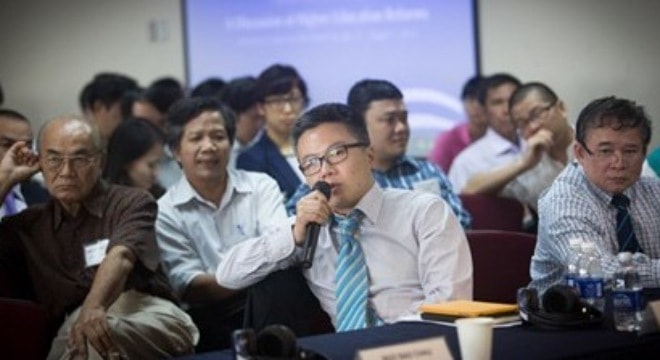Professor Ngo Bao Chau: Should keep university entrance exams, abolish graduation exams
 |
According to Professor Ngo Bao Chau, the high school graduation exam should be abolished and the university entrance exam should be retained.
Referring to the topic of moving towards a national exam in 2015 for which the Ministry of Education and Training is developing a plan, Professor Ngo Bao Chau said: Last year, in an interview, I expressed my opinion on whether or not to maintain the organization of a high school graduation exam that we have been conducting. After citing a number of arguments in support of organizing the exam, I gave some arguments to show that these arguments are not certain. This year, I still reserve that opinion.
We have organized an exam whose honesty is not guaranteed, despite the Ministry of Education and Training’s efforts for many years to improve the exam situation and the reality shows that they have not been as successful as expected. To organize a national exam, we have to use one exam for students nationwide, while the student level of each province/city as well as the requirements of each locality are different. Rural areas are different from urban areas, mountainous areas are different from plains…
 |
Candidates taking the university entrance exam in Hanoi in 2014. Photo: Hong Vinh
There is nothing wrong with the Ministry of Education and Training wanting all places to meet a standard threshold, but does reality allow that? I think not. If so, but we still impose and force a common exam, then localities will have to do it their way so that their children can pass. When there is a discrepancy between the central government's desire (in terms of qualifications) and local reality (in terms of needs), conflicts will arise, and this conflict will be resolved in reality by negative things that no one wants. If political determination can solve this problem, it will only be in the short term of one or two years. To achieve long-term effectiveness, we must change our methods.
- The argument of the Ministry of Education and Training is that only by organizing exams will students study. What do you think, professor?
The question is, what do they want students to learn? If they learn to take exams, it leads to extra classes and all sorts of other problems, all of which cause social discontent without getting anywhere. Is it okay to give exams to students to learn things they don't want to learn?
Public opinion believes that the university entrance exam still ensures seriousness and student classification. Will moving an exam (most likely to be implemented locally) lead to negative consequences and destroy the exam that is considered healthy in Vietnamese education?
Firstly, of the two exams, the university entrance exam is recognized by most people as more honest. It would be unrealistic to want to abandon a well-done exam to only implement an exam that is inherently not well-done. The reason given is that many countries only have graduation exams without university entrance exams and we want to apply such a model. In theory, it seems okay, but I am afraid that in reality, we will not be able to do this effectively. Any exam needs to be given top priority in terms of honesty, not whether it fits a certain model or not. Honesty must be considered the guiding principle of all exams.
Second, the key to the development of Vietnamese universities is still the issue of autonomy, including autonomy in admission. All schools should not be forced to admit students based on the results of the general entrance exam or some intermediate exam. Small schools, or schools that are not qualified enough to organize an entrance exam, can participate in a common entrance exam. Large schools that are confident and capable enough to ensure their autonomy should be allowed to organize their own exams.
The Ministry of Education and Training has announced a draft plan for organizing a national exam. Regarding the exam subjects, the Ministry has proposed three options for public opinion. Assuming that the organization of a national exam has been decided, which option do you support, Professor?
I do not intend to give comments on each specific option, because in my opinion, to do this, it is necessary to have time for careful research and requires the commenters to be experts in the field of testing and evaluation.
- If universities are allowed to organize their own entrance exams, public opinion will fear that candidates will have to take too many exams in one year. What do you think, professor?
That is why I think that all reforms should be done cautiously, and should not be changed suddenly in a large scope. With the high school graduation exam, if it can be eliminated, it should be eliminated, when organizing the exam does not bring any benefits other than wasting social resources. As for the current university entrance exam, it is not too bad, at least in terms of honesty, it should be maintained, but not for all schools. Some schools considered "key" should be allowed to pilot their own admissions if they have the ambition to do so.
In principle, to achieve the best, each school should do it differently, with national coordination so that exams do not overlap. In other countries, schools still recruit students themselves.
- There is an opinion that we should implement a pyramidal university education model, which means expanding university input and tightening output to control quality. What do you think, professor?
I do not completely believe in that theory. For many reasons, including economic reasons, many schools really want to have a lot of students. However, in my observation, for schools that have affirmed their quality and reputation, strict entrance selection is extremely important, even after that they continue to screen and continue serious training. Obviously, strict entrance selection is an undeniable reality of famous schools, even thanks to that they become more famous. We all want all young people to enjoy the same good training conditions, but in reality it is impossible. In society, screening, arrangement, and thereby creating class are inevitable things. That is why there must be honest exams to achieve the highest level of fairness.
Using temporary solutions for too long will lead to many consequences.
- From a positive perspective, what do you think is okay in our education and can be maintained while not being able to make a revolution?
Objectively speaking, our high school graduates are not that bad compared to students in other countries, but our university graduates are relatively behind compared to foreign university graduates. They are behind in both knowledge and working style. From that observation, it can be seen that the problem of Vietnamese education is university education, not general education. Of course, general education also has countless problems and those involved feel insecure about general education. But from a national perspective, university education is the area that needs more changes.
In terms of professional activities, general education may not be too far behind other countries. But from a social perspective, people are very dissatisfied with the way schools are run and organized, such as extra teaching, extra learning, overcharging, etc.
Extra teaching and learning, originated from the idea that it was an initiative, a temporary solution to solve the problem of teachers' salaries. At first, extra teaching seemed to be good, teachers could earn more money when they taught extra classes, parents saw their children learning extra classes, and even had someone to look after their children for a while, so they were satisfied. But when that phenomenon became widespread, even degenerated, for example, children who did not go to extra classes could not do the test in the main class... then we realized its harm. That is the price we have to pay when we do not solve to change the problem that everyone sees thoroughly, but instead use temporary solutions, from which it gives birth to another problem and now we cannot solve both.
- Professors and many scientists have affirmed that people are the decisive factor in the quality of education, so how can we quickly change the quality of people in the university education system?
It is not fast, but we must definitely start policies for young cadres to create a more open labor source for universities, completely eliminating the current local nature of universities. Second, I return to the issue of autonomy, how to make universities capable of orienting their scientific priorities. Each university must have a priority and how to be able to realize those priorities.
- According to the professor, how is the cooperation between domestic universities and Vietnamese scientists working abroad?
I think it is not good. Partly because it is not easy for a Vietnamese person living abroad to participate in training and research activities in the country. In my case, returning home for a few months each year is rare, because my working conditions in the US are quite comfortable. As for others, either they do not have the time, or because of family circumstances... so returning home regularly is difficult. In addition, it seems that they are not given many favorable conditions when they return to work in the country. Even the minimum of paying for their airfare each time they return to work is not yet done by any university. In general, the current "cooperation" spirit of domestic universities is only limited to "exploiting" overseas Vietnamese scientists rather than showing cooperation with them.
Thank you Professor Ngo Bao Chau.
According to Soha.vn
